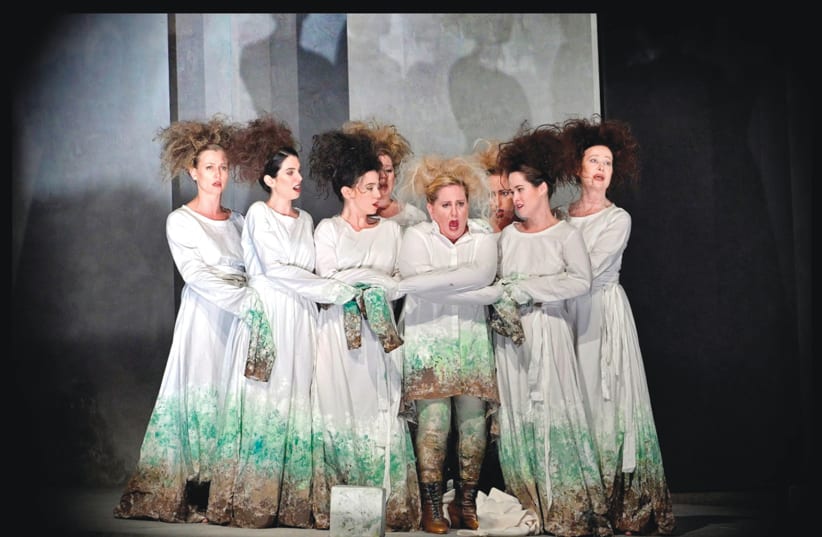Levita is indeed a terrific singer. She so well captured the imaginary divine maker for whom Sebba composed, that I suspect the role will henceforth be associated with her alone.
Sebba composed for a vengeful and petty deity that plays with the lives of the biblical patriarchs before confiding to us that “in truth, my children, you do not need me anymore.” This deeply humanistic vision that asks uneasy questions from the God of our fathers is not entirely new. What makes this production unique is how perfectly well all the pieces fit together, making the production not merely an intellectual triumph but also a masterclass on how a great opera might function.
Let us begin with the concept. Sebba researched and set to music a collective of female voices based on women who are mentioned in the bible but of whom we know little. They range from the four great matriarchs of the Jewish nation (Sarah, Rebeca, Rachel, Leah), to women who are only mentioned as an afterthought to their much more important husbands (wife-of-Lot, wife-of-Potiphar) and ends with women depicted as wise, like the woman of Tekoa (Samuel 2:14). Sadly, more famous women crowded out the humble wise woman from this production and she is only mentioned in the opening scene.
Instead, we get a terrific wealth of roles which include Lot’s wife and her daughters (Natasha Manor, Roni Einav, Lena Fraifeld), Rivka (Daniela Skorka) and Noah’s wife (Manor). The brilliant costumes designed by Maya Meidar Moran give all the biblical women long, hand-covering sleeves. These are employed imaginatively throughout the performance.
These sleeves keep the women “chained” to their places in the scene when Lot’s wife attempts to flee Sodom. When the sleeves are removed – as when Skorka (as Rivka) reveals her hands for the ultimate betrayal of husband and son to deceive Isaac into bestowing the firstborn’s blessing to the younger Jacob instead of Esau by serving the blind patriarch his favorite foods – we know something powerful is about to happen. The sleeves are also used to bind the almighty himself (Levita) in an opera where the women face us to remark “you have erased our names, yet we are forever your mothers.”
One should note how splendidly well the set is organized to serve this production. The circular stage serves as a moving wheel to signify the long trek of Lot’s poor wife. It becomes a water well as Leah and Rachel share the agony of holding a husband cheated by their father Laban.
A sensitive reader of the good book, Sebba is careful to present us with the great irony of divine justice. Jacob cheated his brother, and was cheated when taking a bride. Sara kicked out Hagar, and dies after her husband nearly murders their son Isaac. Sebba is also a generous and witty composer.
When Fraifeld assumes the role of Potiphar’s wife, there are at least two gags for us to catch. The first is a snippet that reminded me of Inta Omri, the well-known Egyptian song composed by Mohamed Abd Elwahab and sung by Umm Kulthum. After all, Joseph is being tempted by an Egyptian woman, so it fits. The snippet never “grows” into the full piece but is thwarted, much like Fraifeld’s character’s passion. Wearing a blond wig and offering Joseph her daughter, as well as her own body, Potiphar’s wife is a parody of female desire gone mad with lust as well as of the shiksa image, the non-Jewish woman.
A word of praise for the smart use of light by Nadav Barnea who floods the stage with red when Skorka (as Rivka) informs Esau that “mother loves you, only a little less” thus sparking hatred between her two sons. We will see this hatred again when Bilha (Roni Einav) and Zilpa (Lilian Ruth) lament the fate of their sons who are placed on Esau’s path should he desire to murder some of Jacob’s children. “Today you will wake up to learn you are cannon fodder” they sing to their sleeping children before adding with venom “all so that Joseph may dream his dreams.”
It is these powerful connections and insights that make me suspect this opera – roughly ninety minutes long and presents stories most Israelis know – is set to be a big hit. This is especially so if we consider how profitable it would be for schools to take their pupils to both see the bible from a new approach ahead of their final exams and be exposed to a highly enjoyable opera. Who knows? Perhaps a teenager who enjoys Mothers will eventually seek Saul by Handel (where the Witch of Endor, a woman who can speak to the dead plays a key part) or Rossini’s Moses in Egypt.
The profound humanism of the production shines through when Manor, as Noah’s wife, complains about the stench rising from the bodies and observes as the rivers recede how awful it is to see loved ones decaying.
“A new world,” she sings, “so full of corpses!”
The scene is so well done it made me think about the late writer Timothy Findley and his award-winning 1984 novel retelling Noah’s myth in Not Wanted on the Voyage.
Though sung in Hebrew, the English-speaking public should not fear this production since English subtitles are provided. Despite some biblical verses being included, most of the arias use modern Hebrew and their English version is also current.
This is Sebba’s second opera following his 2010 adaptation of Alice in Wonderland. Well known for being a master-teacher able to present the joys of opera to a general audience, Mothers can very well be that elusive thing: an opera presented in Hebrew with a shot at becoming a crowd-pleaser while keeping high artistic merit.
Mothers, by David Sebba, was coproduced by The Israeli Opera and Gesher Theatre.
